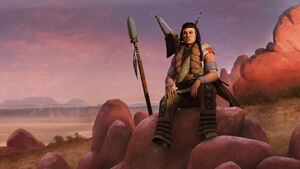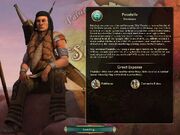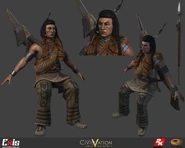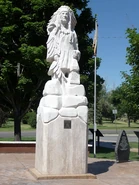Pocatello (1815 – October 1884) was a Shoshone chieftain. He led the Shoshone tribe both in freedom, and on their reservation. He leads the Shoshone in Civilization V: Brave New World.
In-Game[]

Pocatello in game
Pocatello speaks Shoshone. On his diplomacy screen, he is sitting on a rock with a pinkish sky in the background, which suggests a setting sun. He carries a bow on his back and takes up the spear by his side in wartime.
Unique Units: Pathfinder, Comanche Riders
Unique Ability: Great Expanse
Voice Actor: Omar Alexis Ramos
AI Traits[]
| Trait | Amount |
|---|---|
| Competitiveness | 5 (7-3) |
| Wonder Competitiveness | 5 (7-3) |
| City-State Influence Competitiveness | 5 (7-3) |
| Boldness | 5 (7-3) |
| Diplobalance | 5 (7-3) |
| Hate Warmongers | 5 (7-3) |
| Willingness to Denounce | 5 (7-3) |
| Willingness to Declare Friendship | 5 (7-3) |
| Loyalty | 5 (7-3) |
| Neediness | 5 (7-3) |
| Forgiveness | 5 (7-3) |
| Chattiness | 5 (7-3) |
| Meanness | 5 (7-3) |
| Offensive Unit Production | 5 (7-3) |
| Defensive Unit Production | 8 (10-6) |
| Defensive Building Production | 8 (10-6) |
| Military Training Buildings Production | 5 (7-3) |
| Recon Unit Production | 8 (10-6) |
| Ranged Unit Production | 5 (7-3) |
| Mobile Unit Production | 7 (9-5) |
| Naval Unit Production | 3 (5-1) |
| Naval Recon Unit Production | 3 (5-1) |
| Air Unit Production | 5 (7-3) |
| Naval Growth | 3 (5-1) |
| Naval Tile Improvements | 3 (5-1) |
| Water Connections | 5 (7-3) |
| Expansion | 8 (10-6) |
| Growth | 8 (10-6) |
| Tile Improvements | 5 (7-3) |
| Infrastructure (Roads) | 5 (7-3) |
| Production Emphasis | 5 (7-3) |
| Gold Emphasis | 5 (7-3) |
| Science Emphasis | 5 (7-3) |
| Culture Emphasis | 5 (7-3) |
| Happiness Emphasis | 5 (7-3) |
| Great People Emphasis | 5 (7-3) |
| Wonder Emphasis | 5 (7-3) |
| Religion Emphasis | 5 (7-3) |
| Diplomacy Victory | 5 (7-3) |
| Spaceship Victory | 5 (7-3) |
| Nuke Production | 5 (7-3) |
| Use of Nukes | 5 (7-3) |
| Use of Espionage | 5 (7-3) |
| Anti-Air Production | 5 (7-3) |
| Air Carrier Production | 5 (7-3) |
| Land Trade Route Emphasis | 5 (7-3) |
| Sea Trade Route Emphasis | 5 (7-3) |
| Archaeology Emphasis | 5 (7-3) |
| Trade Origin Emphasis | 5 (7-3) |
| Trade Destination Emphasis | 5 (7-3) |
| Airlift Emphasis | 5 (7-3) |
| Likeliness to Declare War | 3 (5-1) |
| Likeliness to be Hostile | 4 (6-2) |
| Likeliness to be Deceptive | 3 (5-1) |
| Likeliness to be Guarded | 7 (9-5) |
| Likeliness to be Afraid | 6 (8-4) |
| Likeliness to be Friendly | 6 (8-4) |
| Likeliness to be Neutral | 6 (8-4) |
| Ignore City-States | 4 (6-2) |
| Friendliness to City-States | 7 (9-5) |
| Protection of City-States | 7 (9-5) |
| Conquest of City-States | 3 (5-1) |
| Bullying of City-States | 3 (5-1) |
Personality and Behavior[]
Pocatello may try to achieve any victory condition, but he will most likely choose either a diplomatic or cultural victory. A domination victory is very unlikely, however.
Pocatello puts a lot of focus on rapid expansion with large ![]() Population sizes and well-defended cities. He also tends to build a strong defensive army that includes many mounted or armored units. His offensive army, tile improvements, and road network, however, are typically average.
Population sizes and well-defended cities. He also tends to build a strong defensive army that includes many mounted or armored units. His offensive army, tile improvements, and road network, however, are typically average.
Pocatello also has a habit of producing a lot of Pathfinders, thus allowing him to meet up with every civilization and befriend and protect every city-state he meets.
Pocatello is a particularly peaceful leader and will rarely declare war on anyone. While he's often guarded, he's relatively easy to befriend. In fact, he is a friendly leader who rarely backstabs his allies.
Civilopedia entry[]
History[]
Chief Pocatello, leader of the Bannock-Shoshone tribe, spent his life attempting to find some means of coexistence with the white settlers encroaching on the Shoshone territory throughout the 19th century. Although the Shoshone under Pocatello did attack settlers and wagon trains, such acts were largely retaliation for depredations and attacks by the whites. Pocatello's band of warriors were blamed for increasing attacks on whites along the California Trail, the Salt Lake Road, and the Oregon Trail.
In the autumn of 1862 Colonel Conner and the Third California Infantry of the U.S. Army arrived from Fort Douglas with orders to "chastise" the natives. Pocatello learned of the approach and led his tribe northward, thus escaping the infamous Bear River Massacre. Pursued by the U.S. Army for five years, Pocatello would sign the 1868 Fort Bridger Treaty by which his tribe was relocated to a reservation on the Snake River. He died there, despairing for the future of his people.
Early Life[]
Born in the Grouse Creek region of what is present-day northwest Utah in the United States, little is known of Pocatello's childhood or early manhood. His given name was Tonaioza, meaning "Buffalo Robe"; likely the name Pocatello was given by white trappers, although why and when is unknown. Pocatello grew to manhood during the fur trapping era of the 1820s and 1830s.
As he grew, his reputation as a warrior and a sage grew also. At the time that Brigham Young led the first Mormon settles into Utah in 1847 AD, Pocatello had been elevated to chief among the Shoshone. Young followed a policy of appeasement and conciliation with Pocatello, who expressed his concerns over the destruction of game and grass lands by the emigrant farmers. Pocatello became increasingly concerned by the migration and movement of whites into and through Shoshone lands, especially in the wake of the discovery of gold in California and Montana.
Defiance[]
Raids on wagon trains and isolated farms, as well as the theft of horses and cattle, increased dramatically in the late 1850s. Whether due to rogue natives, white outlaws, or restless young Shoshone, Pocatello was soon being blamed for every attack. Over the next few years, white settlers and natives engaged in a number of clashes and murders. The intermittent hostilities culminated in August 1862 when Pocatello himself led an attack on a wagon train moving through the City of Rocks in south-central Idaho. A few days later, Shoshone war bands attacked two other wagon trains near the Snake River.
Concerned about the security of overland routes to the west coast as the Civil War progressed, the Lincoln administration ordered Colonel Patrick Connor and his Third California Volunteer Infantry Regiment into Utah to quell the unrest, where they established Camp Douglas three miles east of Salt Lake City. Additional raids by Chief Bear Hunter of the Great Basin Shoshone spurred Connor, along with the Second Regiment California Volunteers Cavalry, to move against the winter encampment in Cache Valley where several Shoshone tribes, including Pocatello's, had gathered. Aware of the approaching white troops, as other chiefs prepared their warriors to fight, Pocatello decided to lead his away. In the process, he avoided the Bear River Massacre, which resulted in approximately 500 Shoshone men, women, and children being killed.
The U.S. Army continued with the pacification program, roaming the area seeking to arrest the remaining Shoshone chiefs, especially Pocatello. Avoiding capture for nearly five years, eventually Pocatello's band was forced to surrender due to illness and starvation. At the Fort Bridger Treaty Council of 1868, Pocatello agreed to forfeit two-thirds of his Shoshone hunting grounds, to permit transit of their lands by whites, and to relocate to the Fort Hall Indian Reservation on the Snake River; for their part, the U.S. government pledged to supply $5000 worth of food and supplies annually.
Reservation[]
As was far too common, the U.S. Indian Bureau failed to keep its promises; food supplies usually arrived spoiled, the promised cash annuities were rarely paid, and the land was unsuitable for farming. In the years following their confinement, the natives suffered severely from disease and hunger. In 1875, after a particularly poor growing season, Pocatello led his tribe off the reservation to a Mormon missionary farm near Corinne, Utah, helping to plant and maintain wheat, corn, potatoes, and garden vegetables, all of which thrived. Pocatello hoped that mass conversion of his people to Mormonism would avoid starvation. White settlers in the area, however, were less obliging and called for their return to the reservation, through force if necessary. When the U.S. Army threatened hostilities, Pocatello led his tribe back to the reservation.
Feeling betrayed yet again, Pocatello and most of the Shoshone rejected Christianity. The old chief, now in his 60s, grew increasingly discontented and withdrew from reservation affairs. Pocatello's health declined precipitously, and he died in 1884. At the request of his tribe, Pocatello was interred dressed in full war attire in a deep spring near the Snake River, along with his best clothing, knives, guns, and 18 of his horses.
Judgment of History[]
As many Native American leaders did, Pocatello struggled to come to terms with the influx of whites. On the one hand, he sought to co-exist with them; on the other, he was determined to protect his people's rights and freedom. Despite being fearless and cunning, in the end all Pocatello could do was bow to the inevitable, leading his surviving people onto a reservation. Although unsuccessful in his efforts to keep his people free to roam their tribal homeland, he is greatly respected by the Shoshone for preserving their cultural heritage. His legacy is reflected in the number of geographic and man-made (not the least of which is Pocatello, Idaho) features named for him - ironically, mostly by whites.
Trivia[]
The spring where Chief Pocatello was buried now lies under the American Falls Reservoir, created when the Snake River was dammed in 1978. According to reports, the spring can sometimes be seen when the water level of the reservoir is low during drought or drainage.
Lines[]
The Shoshoni Online Dictionary provided translations for some of Pocatello's lines.
| Codename | Quote (English translation) | Quote (Shoshone) | Notes |
|---|---|---|---|
| Attacked | I must make the foreigner go away! | Ne gemmai jykwi wai! | |
| Declares War | Shoshone ????, we will kill the white man! | Newe ????, tamme(n) taipo en ????? beka ??? ! | There are 2 separate files for that line. |
| Defeated | You ????? people | Enne(n) newe ????? | Compare with the XML line "This will not be the end of my people, I assure you." |
| Hate Hello | ? | ? | |
| Hate Let's Hear It 01 | (Talk) Quietly! | Teiku! | |
| Hate Let's Hear It 02 | What???? | Hinna ????? | |
| Hate Let's Hear It 03 | What ???? come? | Hii ??? o ki? | |
| Hate No 01 | Be alert, foreigner! | Kemmai iya’ih! | |
| Hate No 02 | ? | ? | |
| Hate No 03 | <angrily> No! | Ge! | |
| Hate Yes 01 | Okay, ???? must | Maiku! ?????noo | |
| Hate Yes 02 | Yes, I must! | Ne ha’a noo! | |
| Hate Yes 03 | This is the one you ask for. | Ai̲se(n) end aa dun niwaih. | |
| Intro | I am Chief Pocatello. You have arrived in the thick of Shoshone land. | Ne Chief Pocatello. eN hanni bide na newe sogope bohonde. | |
| Neutral Hello | Our ???? has arrive! | Dahii ??? bide! | |
| Neutral Let's Hear It 01 | What ???? ! | Hinnan ?????! | |
| Neutral Let's Hear It 02 | All come to listen. | No ki nanggahi. | |
| Neutral Let's Hear It 03 | Yes? | Ha’a? | |
| Neutral No 01 | No! | Ge! | |
| Neutral No 02 | Perhaps, no. | Noo man ge. | |
| Neutral No 03 | Be alert, foreigner. | Kemmai iya’ih. | |
| Neutral Yes 01 | Yes, okay. | Haa, maiku. | |
| Neutral Yes 02 | It shall be that way. | Sunniyu(n) do’i. | |
| Neutral Yes 03 | ? | ? | |
| Peaceful | Even though you grow evil (not entirely sure of the meaning of this part), foreigner, I ???? spirit. | Emme(n) noo atsa ???? hanna ???, ? ne ene’en???? | Compare with the XML line "This loss will do little to dampen our spirit." |
| Request | I listen ???? | Ne nanga ??? | Compare with the XML line "Would you listen to my proposal?" |
Intro[]

Blessings be upon you, wise and fearsome Chief Pocatello, revered leader of the Shoshone people. As the young chieftain of the Shoshone, you rose to face a wave of encroaching American settlements across the western United States. Forced to defend the Shoshone ancestral lands from a seemingly endless stream of new emigrants, your war band struck fear into those who would claim the sacred lands of your people. After years of strife, you skillfully avoided a direct conflict with the armies of the U.S. government, and negotiated a series of treaties in the hopes of establishing a lasting peace for the Shoshone.
Most esteemed Pocatello, your people once again look to you for guidance. Will you conquer your enemies, driving them far from your lands? Or will you seek out peaceful diplomacy and trade? Will you build a civilization that stands the test of time?
Gallery[]
| Civilization V Leaders [edit] |
|---|
| Ahmad al-Mansur |
| 1 Requires a DLC
|




